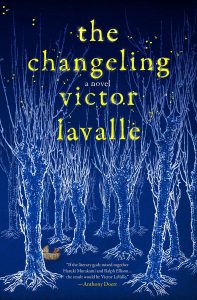 The Changeling, by Victor Lavalle, is, at its core, a book about fatherhood, what it means to be a good father. Apollo, who has his own daddy issues, having been abandoned by his dad when he was a young kid, is now a father himself. However, his world is completely shattered when… well, I won’t say more about what happens. Suffice it to say that Apollo undergoes a quest to find out what really happened to him and, more importantly, why.
The Changeling, by Victor Lavalle, is, at its core, a book about fatherhood, what it means to be a good father. Apollo, who has his own daddy issues, having been abandoned by his dad when he was a young kid, is now a father himself. However, his world is completely shattered when… well, I won’t say more about what happens. Suffice it to say that Apollo undergoes a quest to find out what really happened to him and, more importantly, why.
The Changeling takes place in modern New York City but infuses elements of Nordic mythology. All of this is to examine what it means to be a father, not only from Apollo’s perspective as both a son and a father himself, but also from others, including those of the bad guys. At one point, Apollo self-congratulates himself on being a so-called “new dad”: “New Dads carry the diaper bag — really a big old purse — without awareness of shame. New Dads are emotionally available. New Dads do half the housework (really more like 35 percent, but that’s still so much better than zero). New Dads fix all the mistakes the Old Dads made.” However, later, another character rants at Apollo: “I know you. One of these special new fathers. You’re going to document every moment, every breath of your child’s life. You take videos of them while they’re sleeping and slap them on the computer before the baby wakes up. You think you’re being so loving. You’ll be a better father than the one who raised you!… But let me tell you what I see instead. The neediness of it. The begging to be applauded. As if the praise of a thousand strangers would ever make up for the fact that you didn’t feel loved enough as a child.” This is the real tension in the book: what makes a good father? To what lengths do good fathers go? Even the bad guys are motivated, in some sense, by being good fathers. The entire chain of events that lead to Apollo’s misery begin with an act, centuries before, of a father trying to do right by his family.
Lavalle’s characters come alive through their interactions between one another. Apollo is the central character, but his wife Emma, their son Brian (named after Apollo’s long-vanished dad), his best friend Patrice, his mother Lillian, and others make for a complex set of characters that are all well-developed and add to the richness of Apollo’s world. At various times, Apollo has reason to doubt all of them, emphasizing how we are all ultimately, to some degree, navigating this world on our own. And, especially in his world, Apollo has no idea of whom he can trust.
Lavalle has a sharp wit and keen insight that makes for pleasurable reading. Here are some of my favorite lines :
- “‘Women only like jerks.’ That’s the mantra of dudes who have made themselves undateable but aren’t willing to take the blame.“
- “The only real magic is the things we’ll do for the ones we love.“
- “Do you know how much harm ‘happily ever after’ has done to mankind?“
- “The last two days had been an uncut drug, an overdose of the improbable.”
- “In America your name must be convenient or it must be changed.”
- “What lengths will people stretch to believe they’re still good?”
This last line emphasizes that, in the world of The Changeling, while there are certainly bad guys, they aren’t evil, per se, in the sense that they are inherently trying to do bad things. They think they are doing good things, they are doing the right thing. They are wrong, but they don’t realize it. They have motivations that, to them, seem reasonable and maybe even right. It is the kind of grey world that most appeals to me.